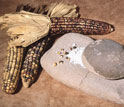News Release 09-204
NSF Awards 32 New Projects for Plant Genome Research
Projects will better define plant responses to changing environments and contribute to our understanding of genetic processes in economically important plants
October 20, 2009
This material is available primarily for archival purposes. Telephone numbers or other contact information may be out of date; please see current contact information at media contacts.
The National Science Foundation (NSF) has made 32 new awards totaling $101.6 million during the twelfth year of its Plant Genome Research Program (PGRP).
These awards--which cover two to five years and range from $500,000 to $10.4 million--support research and tool development to further knowledge of genome structure and function. They will leverage sequence and functional genomics resources to increase understanding of gene function and interactions between genomes and the environment in economically important crop plants such as corn, cotton, rice, soybean, tomato and wheat.
"Clearly, we are now beginning to see the breadth of the effects of NSF investments in plant genomics. The knowledge gained in these projects will serve as the basic foundation that will ultimately enable plant biologists and breeders to develop crop plants that are higher yielding and better able to adapt to a changing environment," said James P. Collins, former NSF assistant director for biological sciences.
The new awards--made to 53 institutions in 30 states--include international groups of scientists from Africa, Asia, Europe and Central and South America.
First-time recipients of PGRP awards include Bowie State University, Brigham Young University, Central Michigan University, College of Wooster, Hamline University, Miami University, Montclair State University, New College of Florida, HudsonAlpha Institute and the University of Maryland-College Park.
The development of a wealth of genomics tools and sequence resources developed over the past 12 years of the PGRP continues to enable exciting, new comparative approaches and predictive modeling to uncover gene networks that regulate plant development and growth in changing environments.
Projects include:
- Research led by teams at the Cold Spring Harbor Laboratory; University of California, Berkeley; University of California, Davis; University of Illinois, Urbana/Champaign; University of Missouri, Columbia; University of Virginia; and Yale University that will address new, testable hypotheses for the mechanism(s) of hybrid vigor in plants.
- An interdisciplinary effort led by Cornell University/U.S. Department of Agriculture Agricultural Research Service (USDA-ARS) to study the gene effects and interactions that underlie variation in complex traits in maize and its wild relative, teosinte. In collaboration with scientists in Mexico and Africa, this project will provide resources and information critical for developing the ability to model and predict phenotype from genotype.
- Research led by the University of Texas-Austin to elucidate the basic physiological and molecular responses to field imposed drought stress in switchgrass as a first step to modeling plant performance in response to future climate change.
- An international consortium led by the Boyce Thompson Institute for Plant Research/USDA-ARS to complete the sequence of the tomato genome and to develop computational web-based tools and resources that will enable basic and applied research in the Solanaceae.
- Research led by Indiana University to generate a diverse collection of sequence and biological resources for the continued study of the Compositae, one of the largest, most diverse, and most economically important plant families of over 40 domesticated species that include lettuce, sunflower and safflower as well as some of the world's most noxious weeds
The PGRP, which was established in 1998 as part of the National Plant Genome Initiative coordinated by the Interagency Working Group on Plant Genomes of the National Science and Technology Council with representatives from USDA, U.S. Department of Energy, National Institutes of Health, NSF, U.S. Agency for International Development, Office of Science and Technology Policy, and Office of Management and Budget, works to advance the understanding of the structure and function of genomes of plants of economic importance.
This year's awards were selected from a pool of outstanding proposals, many of which leverage data and other resources previously produced with PGRP funding and/or funding from USDA-ARS, USDA Cooperative State Research, Education and Extension Service, and Department of Energy. The interdisciplinary projects, which leverage resources across multiple agencies, highlight the success of the NPGI in enabling transformational research with the potential to address urgent societal needs.
-NSF-
-
Maize.
Credit and Larger Version
Media Contacts
Lily Whiteman, National Science Foundation, (703) 292-8310, email: lwhitema@nsf.gov
Program Contacts
Diane Jofuku Okamuro, National Science Foundation, (703) 292-4400, email: dokamuro@nsf.gov
Related Websites
A complete list of 2009 PGRP awards: http://www.nsf.gov/bio/pubs/awards/pgr.htm
The U.S. National Science Foundation propels the nation forward by advancing fundamental research in all fields of science and engineering. NSF supports research and people by providing facilities, instruments and funding to support their ingenuity and sustain the U.S. as a global leader in research and innovation. With a fiscal year 2023 budget of $9.5 billion, NSF funds reach all 50 states through grants to nearly 2,000 colleges, universities and institutions. Each year, NSF receives more than 40,000 competitive proposals and makes about 11,000 new awards. Those awards include support for cooperative research with industry, Arctic and Antarctic research and operations, and U.S. participation in international scientific efforts.
Connect with us online
NSF website: nsf.gov
NSF News: nsf.gov/news
For News Media: nsf.gov/news/newsroom
Statistics: nsf.gov/statistics/
Awards database: nsf.gov/awardsearch/
Follow us on social
Twitter: twitter.com/NSF
Facebook: facebook.com/US.NSF
Instagram: instagram.com/nsfgov




